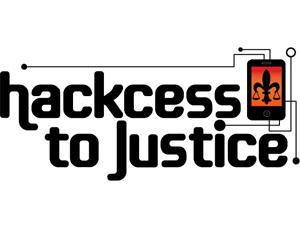Winning app at Hackcess to Justice New Orleans helps clients preserve evidence

The team that built the app Igiari hailed from Xavier University. They placed fifth in the competition. Photo by Jill Chanen.
Ensuring that all Americans have sufficient access to justice has been one of the top priorities of the American Bar Association. One of the states with the largest gaps between the demand for legal services and the availability of adequate legal resources is Louisiana. According to the National Association of Public Defenders, Louisiana public defenders are overworked and underfunded while dealing with one of the largest per-capita incarceration rates in the world. Meanwhile, the Gambit reported in February that with looming budget cuts on the horizon, several public defender districts could go broke.
Accordingly, New Orleans was an excellent venue for the ABA Journal’s second “Hackcess to Justice” legal hackathon. The hackathon, which was co-sponsored by the Louisiana State Bar Association, took place at Loyola University College of Law on Saturday and Sunday.
Like the inaugural hackathon, which took place in Boston at Suffolk University Law School last August, last weekend’s event invited attorneys, computer programmers and other interested individuals to participate in an event with the purpose of creating apps or programs designed to increase the ability of individuals to gain access to legal services.
Monte Mollere, director of the Access to Justice Department for the Louisiana State Bar Association, pointed out that for civil cases, the access gap is just as bad as for criminal cases.

“Just how great is the need for civil legal aid in Louisiana?” Mollere asked. “Twenty-eight percent of the state’s children live below the poverty line.”
Mollere served as one of five judges at the hackathon alongside Mark Cunningham, a partner at Jones Walker and president-elect of Louisiana State Bar Association; Nadine Ramsey, a New Orleans City council member; Abid Hussain, a solo practitioner at Hussain Law LLC; and Glenn Rawdon, program counsel for technology at the Legal Services Corporation.
“It is a myth that moderate and low-income people can’t afford smart phones–that is why these hackathons are so important,” said Rawdon in his opening remarks.
The LSC issued the “Report of the Summit on the Use of Technology to Expand Access to Justice” in 2013, which outlined many of the access to justice deficiencies in the United States. Rawdon encouraged participants to think of new ways to reinvent the law.
“The guy who cuts my hair sends me a text to remind me of my appointment,” Rawdon pointed out. “Why can’t courts do that to remind litigants?”
The entries in the hackathon were designed not only to benefit private individuals, but also to help attorneys do their jobs more efficiently. Seven teams submitted projects to be judged as part of the competition.
Total monetary prizes were worth $3,000 for the top three finishers. The first place winners received $1,500 and a week of consulting from New Orleans-based 52Businesses, while the second place team won $1,000 and third place received $500.
FIRST PLACE
First prize went to Legal Proof, an iOS app that allows attorneys and individuals to collect and keep track of evidence to be used in a variety of civil law cases. Designed by Omega Ortega LLC, the app allows users to take photos of documents or other pieces of evidence, and then extrapolates metadata and other important information such as location and time stamp to be used in emails or messages to lawyers or other important parties. “During [Saturday’s] briefing, it was clear that people–especially people who cannot afford legal representation–need help keeping track of evidence,” Tom Ortega II said in his project description. “Much civil litigation could be avoided by simply keeping some basic evidence, hence Legal Proof was born.”
SECOND PLACE
Second place went to Somerville, Massachusetts, attorney William Palin and New Orleans attorney Ernie Svenson, who created an automatic document generation app called PaperLess. Palin won the inaugural Hackcess to Justice in Boston last August with an automated living will and trust document generator. PaperLess is designed for legal aid attorneys to determine the eligibility of their clients and to send and receive legal documents. “The app would allow organizations to text clients without sharing a phone number and allow clients to continue to communicate without a phone plan or if their minutes run out,” Palin and Svenson wrote in their project submission. “The app even supports push notifications and local reminders, so clients will be reminded of upcoming meetings, court dates and other legal issues.”
THIRD PLACE
Third prize was awarded to a team from Operation Spark, a New Orleans-based nonprofit that helps prepare youths and young adults for careers in software development. Their app, ExpungeMe, is an automated document generator that allows individuals to prepare and file expungement requests without the need for an attorney. Noting that the forms and process can be extremely complicated, the team behind ExpungeMe came up with the app to guide individuals through the process while freeing up attorneys to do other things.
OTHER CONTENDERS
Fourth place went to Simple Rights, an app that provides simplified legal information. Fifth place was awarded to Igiari, an Android app that allows users to search for affordable legal aid nearby. Other submissions were a court-cost calculator for Orleans and Jefferson Parishes in Louisiana, and an app specializing in landlord-tenant law.
For more information about Hackcess to Justice, click here.


